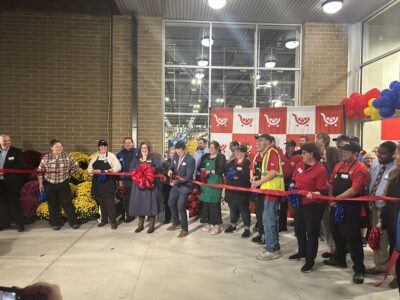Douglas County Commission unanimously approves revised rules for wind energy projects

photo by: Journal-World
The west side of the Douglas County Courthouse, 1100 Massachusetts St.
The Douglas County Commission adopted revised rules for wind energy projects in the county on Wednesday after a more than five-hour-long meeting dedicated solely to the topic.
At Wednesday’s County Commission meeting, commissioners voted unanimously to approve the rules, closing the book on a revision process that’s been underway for more than two years. It’s the second major decision related to renewable energy the group has made in the past month, after commissioners in mid-April approved a conditional use permit for the 1,105-acre Kansas Sky Energy Center solar project just north of the City of Lawrence.
The revised rules, notably, come with a 2,500-foot minimum setback distance from the property line for property owners who aren’t participating in a project.
That’s a requirement all three commissioners voiced support for, with Commission Vice Chair Shannon Reid saying that the distance seemed reasonable given the totality of the circumstances. Reid also noted that there were existing wind rules on the books in Douglas County — and much less stringent ones, at that — which means there wasn’t anything stopping a project from being submitted for review.
“For me personally, I have been eager to get to this point where we set more stringent standards and regulations in preparation for the possibility of that,” Reid said. “And we are not talking about any specific projects here — we are talking about standards, and I think that all of the standards that are in these regulations were thoroughly researched and deliberated and determined by a majority of our planning commissioners, and I do respect that.”
That distance, community members and members of the Lawrence-Douglas County Planning Commission have said, provides some protection against risks like ice throw from wind turbine blades. The Planning Commission was the previous step in the approval process, and that group voted 6-3 to recommend the County Commission adopt the revised rules.
Reid later added that she “doesn’t buy” a claim made by some members of the public at this meeting and others — that the 2,500-foot setback distance effectively makes it impossible to develop a large-scale wind project in Douglas County. Rather, she said it creates a higher bar for developers to clear, as the new rules mean applicants will have to undertake some serious legwork before a project would be eligible for review.
Until now, a developer simply needed to submit a conditional use permit and then follow the standard public hearing process ending at the Douglas County Commission level in order to bring a commercial wind energy project to the county. The new rules, however, require nearly a dozen separate plans and assessments describing potential impacts and management strategies.
And once a project is eligible for review, Commissioner Patrick Kelly pointed out that the conditions specific to that project may end up even more stringent than what commissioners spoke about Wednesday.
“I’ve said it before, (conditional use permits) are tough because they often involve additional conditions that aren’t in the regulations but come down later,” Kelly said. “… Many of the issues that were brought up tonight are valid issues, a hundred percent, that really need to be considered. I have confidence that they’re in the (regulations) in a way that we can deal with them when we get an application before us.”
Commissioner Chair Karen Willey said there’s one point that many community members have made throughout the process that is very relevant to the new wind rules — that Douglas County is more populated than many other areas that host large-scale wind energy projects.
“That, to me, doesn’t say necessarily that we ban it,” Willey said. “It just means that there is a very high lift for something that would be appropriate here, and I think that all comes down to that community buy-in.”
In the lead-up to the vote just before 11 p.m. Wednesday, commissioners heard more than three hours of public comment from dozens of community members. Many of those commenters said they didn’t want commissioners to approve the revised rules because they’re against commercial-scale projects.
A few commenters had also called on Willey to recuse herself from the decision based on a potential conflict of interest with renewable energy giant NextEra Energy Resources, which for a number of years has been exploring the viability of a commercial-scale wind project in southwestern Douglas County. Willey did answer questions from the Journal-World about the potential conflict earlier in April, and noted that she does not and has never had a contract with NextEra of any kind.
Willey didn’t comment on any of those claims specifically during the meeting, but she did say that she’d “absorbed a fair amount of hatred” and heard “a lot of falsehoods” from community members.





